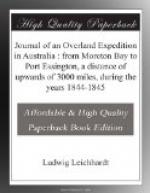As we passed the Cycas groves, some of the dry fruit was found and tasted by several of my companions, upon whom it acted like a strong emetic, resembling in this particular the fruit of Zamia spiralis, (R. Br.) of New South Wales. The natives, at this season, seemed to live principally on the seeds of Pandanus spiralis, (R. Br.) and Cycas; but both evidently required much preparation to destroy their deleterious properties. At the deserted camp of the natives, which I visited yesterday, I saw half a cone of the Pandanus covered up in hot ashes, large vessels (koolimans) filled with water in which roasted seed-vessels were soaking; seed-vessels which had been soaked, were roasting on the coals, and large quantities of them broken on stones, and deprived of their seeds. This seems to show that, in preparing the fruit, when ripe, for use, it is first baked in hot ashes, then soaked in water to obtain the sweet substance contained between its fibres, after which it is put on the coals and roasted to render it brittle when it is broken to obtain the kernels.
I also observed that seeds of Cycas were cut into very thin slices, about the size of a shilling, and these were spread out carefully on the ground to dry, after which, (as I saw in another camp a few days later) it seemed that the dry slices are put for several days in water, and, after a good soaking, are closely tied up in tea-tree bark to undergo a peculiar process of fermentation.
The Cycas disappeared where the fresh water commenced; and it seemed to be confined to the sandy soil near the salt water.
Sept. 17.—I stopped at Cycas Creek, to allow our old bullock to recover, as it was easier for us to drive him than to carry his meat, heavily laden as our other bullocks were.
The emu meat became so tainted that it affected our bowels, and I had consequently to reserve it for the dog. As the nutritious qualities of our meat decreased, I had increased the daily allowance from five pounds to seven; allowing two pounds and a half for breakfast, the same quantity for luncheon, and two pounds for dinner. Mr. Roper had slowly recovered, but sufficiently to mount his horse without assistance.
We were sadly distressed for want of clothing. The few shirts which we had taken with us, became so worn and threadbare, that the slightest tension would tear them. To find materials for mending the body, we had to cut off the sleeves, and, when these were used, pieces were taken from the lower part of the shirt to mend the upper. Our trowsers became equally patched: and the want of soap prevented us from washing them clean. We had, however, saved our shoes so well, by wearing mocassins while travelling along the eastern coast, that every one was well provided, particularly after the death of Mr. Gilbert, whose stock of clothes I divided among my companions.
Sept. 18.—I went with Charley to reconnoitre the country between Cycas creek and the Robinson. A foot-path led us from one to the other, passing through a series of Cycas groves, box and tea-tree forest, and thickets of tea-tree and Cypress pine. The latter covered long tracts near the Robinson, and frequently attained a large size.




